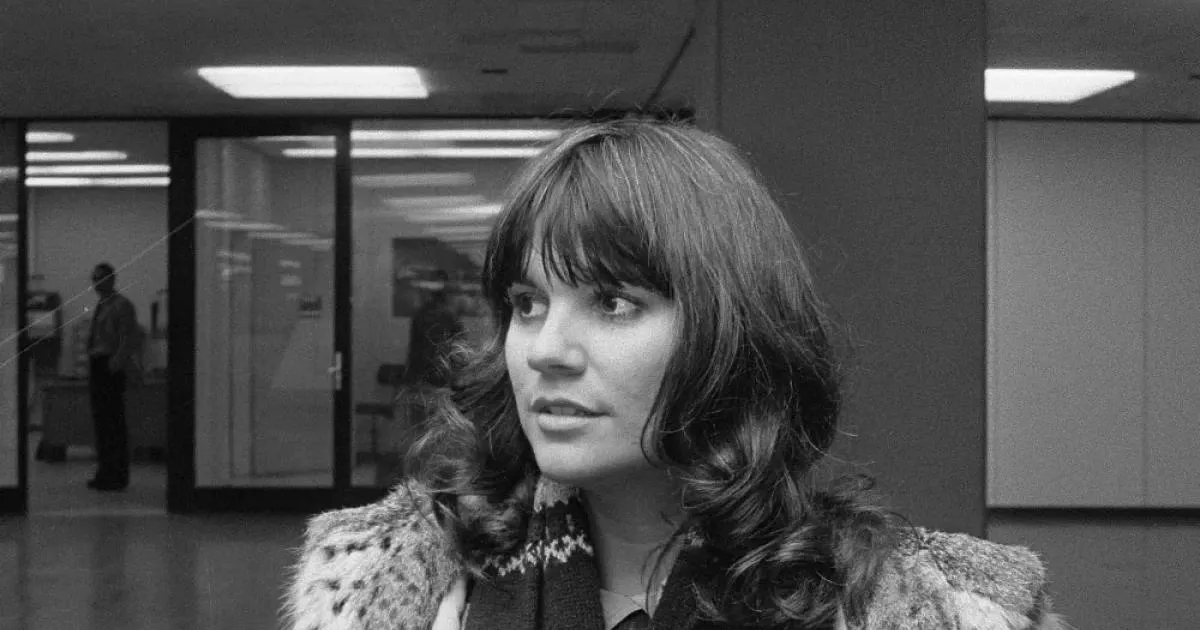Linda Ronstadt is a versatile American singer renowned for her ability to traverse diverse musical genres, including rock, country, light opera, the Great American Songbook, and Latin music. Her successful career cemented her status as a prominent figure in the music industry, showcasing her adaptability and vocal talent across various styles and earning her critical acclaim and a devoted following.
1903: Federico Ronstadt's Contribution to Tucson's Mobility
In 1903, Federico José María Ronstadt, Linda's grandfather, contributed to Tucson's mobility by delivering six mule-drawn streetcars.
1911: Birth of Gilbert Ronstadt
In 1911, Gilbert Ronstadt, Linda Ronstadt's father, was born. He was a machinery merchant who ran the F. Ronstadt Co.
1914: Birth of Ruth Mary Copeman Ronstadt
In 1914, Ruth Mary (née Copeman) Ronstadt, Linda Ronstadt's mother, was born. She was a homemaker.
January 1946: Publication of Canciones de mi Padre by Luisa Espinel
In January 1946, the University of Arizona published a booklet by Luisa Espinel entitled Canciones de mi Padre. Luisa Espinel, Ronstadt's aunt, was an international singer in the 1920s and 1930s. Espinel's father was Fred Ronstadt, Linda Ronstadt's grandfather, and the songs she had learned, transcribed, and published were some of the ones he had brought with him from Sonora.
July 15, 1946: Linda Ronstadt's birth
On July 15, 1946, Linda Maria Ronstadt was born. She later became a versatile American singer, known for her performances in various genres.
1953: Family Featured in Family Circle Magazine
In 1953, the Ronstadt family, including young Linda Ronstadt, was featured in Family Circle magazine, offering a glimpse into their family life.
1963: "Heat Wave" originally released by Martha and the Vandellas
In 1963, Martha and the Vandellas originally released the song "Heat Wave", which Linda Ronstadt later covered with a rock version that gained significant airplay in 1975.
1964: Visit to Los Angeles and Decision to Move
During Easter break from college in 1964, Linda Ronstadt visited Bobby Kimmel in Los Angeles. Later that year, she decided to move there permanently to form a band with him.
1964: Move to Los Angeles
In 1964, at the age of 18, Linda Ronstadt decided to move to Los Angeles after a semester at the University of Arizona to pursue a career in music, aiming to blend folk music with rock 'n' roll.
1965: "I Knew You When" hit
In 1965, "I Knew You When" by Billy Joe Royal, which Linda Ronstadt covered on her "Get Closer" album in 1982, was a hit.
1966: Signing with Capitol Records as "The Stone Poneys"
In the summer of 1966, Linda Ronstadt, along with Bobby Kimmel and Kenny Edwards, were signed by Nik Venet to Capitol Records as "The Stone Poneys".
1967: Release of Albums by The Stone Poneys
In 1967, The Stone Poneys, featuring Linda Ronstadt, released three albums: The Stone Poneys, Evergreen, Volume 2, and Linda Ronstadt, Stone Poneys and Friends, Vol. III.
1968: Ronstadt likens ranchera music to "Mexican bluegrass"
In 1968, Linda Ronstadt described ranchera music as similar to "Mexican bluegrass", integrating country and ranchera influences into her rock and pop music, drawing from her Southwestern roots.
1969: Release of 'Hand Sown ... Home Grown'
In 1969, Linda Ronstadt released her first solo album, "Hand Sown ... Home Grown", which has been described as the first alternative country record by a female recording artist.
1969: First Solo Album and Contribution to "Free Creek" Project
In 1969, Linda Ronstadt released her first solo album, "Hand Sown ... Home Grown", while still under contract with Capitol Records. During the same year, she also contributed to the Music from Free Creek "super session" project.
1969: Fusion Magazine Interview on Being a 'Chick Singer'
In a 1969 interview in Fusion magazine, Linda Ronstadt spoke about the challenges of being a single "chick singer" with an all-male backup band, including the ego problems of musicians being labeled sidemen for a female singer.
March 1970: Release of 'Silk Purse'
In March 1970, Linda Ronstadt released her second solo album, "Silk Purse", recorded in Nashville and produced by Elliot Mazer. The album earned her first Grammy nomination for "Long Long Time".
1970: Ronstadt criticized for genre-crossing music
As early as 1970, Linda Ronstadt faced criticism from music purists for blending various genres, with some feeling she was too gentle for rock, too pop for folk, and not easily understood by pop audiences, though she gained popularity among country fans.
1971: Touring with Future Eagles and Album Release
In 1971, Don Henley, Glenn Frey, Bernie Leadon, and Randy Meisner, who later formed the Eagles, toured with Linda Ronstadt. Also in 1971, her eponymous third album, "Linda Ronstadt", was released, but her version of Browne's "Rock Me on the Water" failed as a single. She also began working with John Boylan and considered moving to Asylum Records.
1972: Commercial Success
Linda Ronstadt's first commercial failure occurred in 1972.
1973: Production of 'Don't Cry Now' Album Begins
In 1973, Linda Ronstadt began working on her fourth solo album, "Don't Cry Now", initially with John Boylan and JD Souther as producers, but later enlisting Peter Asher to co-produce tracks like "Sail Away" and "I Believe in You".
1974: Ronstadt's views on finding a mate
In 1974, Linda Ronstadt expressed her challenges in finding a compatible mate, highlighting the difficulties of balancing personal connection with musical inspiration, in Crawdaddy magazine.
1974: Opening Act for Neil Young and Meeting Emmylou Harris
In 1974, Linda Ronstadt took on her biggest gig to date, opening for Neil Young's Time Fades Away tour, and met Emmylou Harris backstage at a concert in Texas. By the end of 1974, her album "Don't Cry Now" had sold 300,000 copies, marking her most successful album up to that time.
1974: Inclusion of Heart Like a Wheel on Rolling Stone's 500 Greatest Albums of All Time
In 1974, Linda Ronstadt's album "Heart Like a Wheel" was included in "Rolling Stone's 500 Greatest Albums of All Time" at number 164.
1974: Carole King's record matched by Ronstadt
In 1978, Linda Ronstadt achieved a third number 1 album on the Billboard Album Chart, matching the record set by Carole King in 1974.
1974: Crawdaddy Interview on Being Taken Advantage Of
In a 1974 interview with Peter Knobler in Crawdaddy, Linda Ronstadt expressed feeling that people are always taking advantage of you and those interested in you have an angle.
1974: Rock 'N' Roll Woman describes Ronstadt's musical preferences
In the 1974 book Rock 'N' Roll Woman, author Katherine Orloff describes Linda Ronstadt's musical preferences as leaning towards rhythm and blues, with the goal of fusing country and rock into a unique blend.
March 1975: Ronstadt featured on Rolling Stone cover
In March 1975, Linda Ronstadt appeared on the cover of Rolling Stone, marking the first of six covers shot by Annie Leibovitz. The feature, written by Ben Fong-Torres, discussed Ronstadt's struggles in rock and roll, her personal life, and her experiences as a woman touring in a male-dominated environment.
September 1975: Release of "Prisoner in Disguise" album
In September 1975, Linda Ronstadt's album Prisoner in Disguise was released, quickly climbing into the Top Five on the Billboard Album Chart and selling over a million copies. It was her second consecutive platinum album. The album's first single was "Love Is A Rose", but "Heat Wave", a rock version of the 1963 hit by Martha and the Vandellas, gained significant airplay, leading Asylum to switch the singles. "Heat Wave" hit the Top Five on Billboard's Hot 100, while "Love Is A Rose" reached the Top Five on Billboard's country chart.
1975: Start of Platinum Album Streak
In 1975, Linda Ronstadt began a streak of consecutive platinum-selling albums that lasted until 1990.
1975: Concert Performances with Jackson Browne, the Eagles, and Toots and the Maytals
In 1975, Linda Ronstadt performed in shows alongside Jackson Browne, the Eagles, and Toots and the Maytals, contributing lead vocals to various songs including the Eagles' "Desperado", and playing tambourine and acoustic guitar on others.
1975: Ronstadt's breakthrough year in music business
In 1975, Linda Ronstadt, at 29 years old, achieved significant recognition in the music industry, marking it as her belated breakthrough year.
1976: Ronstadt appears on Rolling Stone cover
In 1976, Linda Ronstadt appeared on the cover of Rolling Stone. The cover story featured photographs by Annie Leibovitz, including some revealing images of Ronstadt that she felt deceived by.
1976: Collaboration with father on "Lo siento mi vida"
In 1976, Linda Ronstadt collaborated with her father to write and compose a traditional Mexican folk ballad, "Lo siento mi vida", which she included on Hasten Down the Wind.
1976: Release of Greatest Hits
In 1976, Linda Ronstadt released "Greatest Hits", her highest-selling album to date, which was certified for over seven million units sold as of 2001.
1976: Ronstadt's album 'Hasten Down the Wind' reaches Top 3
In 1976, Linda Ronstadt's album Hasten Down the Wind reached the Top 3 of Billboard's Album Chart. She also won her second Grammy Award for Best Female Pop Vocal Performance for the album, her third consecutive platinum album. The album featured a revealing cover and included two songs written by Ronstadt, "Try Me Again" and "Lo Siento Mi Vida."
1976: Ronstadt's version of "That'll Be The Day" appears
In 1976, Linda Ronstadt's version of Buddy Holly's "That'll Be The Day" was recorded, later to be included on a tribute album released in 2011.
1976: Rolling Stone Interview on Road Loneliness
In a 1976 interview with Cameron Crowe in Rolling Stone, Linda Ronstadt described the profound loneliness experienced while touring as a musician.
1977: Ronstadt appears on Time cover
In 1977, Linda Ronstadt appeared on the cover of Time. A 1977 interview highlights Ronstadt's feeling that Annie Leibovitz saw her Rolling Stone picture as an exposé of her personality.
1977: Release of Simple Dreams
In 1977, Linda Ronstadt released "Simple Dreams", one of her biggest-selling studio albums, which was later certified by the Recording Industry Association of America for over three million copies sold.
1977: Ronstadt sings National Anthem at World Series
In 1977, Linda Ronstadt was invited by the Los Angeles Dodgers to sing the U.S. National Anthem at game three of the World Series against the New York Yankees.
1977: Ronstadt upset by Time cover image
In 1977, Linda Ronstadt was upset by her appearance on the cover of Time magazine, feeling that the image projected a false image of her. She disliked the dress she was forced to wear for the photo.
1977: Release and success of "Simple Dreams" album
In 1977, Linda Ronstadt's album Simple Dreams surpassed the success of Heart Like a Wheel. It spent nine weeks at number 2 behind Fleetwood Mac's Rumours, then held the number 1 position for five weeks on the Billboard 200 chart. It sold over 3 1⁄2 million copies in less than a year in the U.S. alone, a record for a female artist. The album spawned hit singles such as "Blue Bayou", "It's So Easy", "Tumbling Dice", and "Poor Poor Pitiful Me". The album garnered Grammy Award nominations and won a Grammy Award for Best Album Cover for its art director, Kosh. In late 1977, Ronstadt became the first female recording artist to have two songs in the U.S. Billboard Hot 100 Top Ten at the same time: "Blue Bayou" at No. 3 and "It's So Easy" at No. 5.
1977: "Crazy" becomes a Top 10 Country hit
In early 1977, Linda Ronstadt's interpretation of Willie Nelson's ballad "Crazy", from her 1976 album "Hasten Down the Wind", became a Top 10 Country hit.
July 21, 1978: Ronstadt joins The Rolling Stones onstage in Tucson
On July 21, 1978, Linda Ronstadt made a guest appearance onstage with The Rolling Stones at the Tucson Community Center in her hometown of Tucson, where she and Mick Jagger sang "Tumbling Dice". Ronstadt expressed her enjoyment of the performance and lack of stage fright.
October 1978: Country Music magazine acknowledges Ronstadt's success
In October 1978, Country Music magazine recognized Linda Ronstadt's success, stating that Simple Dreams had solidified her role as the most successful female rock and roll and country star at that time.
1978: Ronstadt becomes "highest-paid woman in rock"
By the end of 1978, Linda Ronstadt had established herself as one of the most successful solo female acts in rock and pop. Due to her platinum album success and ability to sell out concerts in arenas and stadiums, she became known as the "highest-paid woman in rock", earning over $12 million and selling 17 million albums.
1978: Ronstadt recognized as one of "The Queens of Rock"
By the end of the decade, Linda Ronstadt had surpassed her female competition in record sales. In 1978, Us Weekly reported that Ronstadt, Joni Mitchell, Stevie Nicks, and Carly Simon had become "The Queens of Rock", signifying a shift in the music industry towards female artists.
1978: Appearance in FM
In 1978, Linda Ronstadt appeared as herself in the drama FM, showcasing concert footage.
1978: Ronstadt featured in film FM
In 1978, Linda Ronstadt appeared in the film FM, which featured disc jockeys attempting to broadcast her concert live. The film included Ronstadt performing the songs "Poor, Poor Pitiful Me", "Love Me Tender", and "Tumbling Dice". Mick Jagger encouraged Ronstadt to record "Tumbling Dice" after a concert.
1978: Attempted Trio Album
In 1978, Linda Ronstadt, Dolly Parton, and Emmylou Harris attempted to collaborate on a Trio album, but the effort was abandoned due to conflicting schedules and career priorities.
1978: Ronstadt declared "America's best-known female rock singer"
In 1978, Rolling Stone declared Linda Ronstadt "by far America's best-known female rock singer." She achieved a third number 1 album on the Billboard Album Chart with Living in the USA and had a major hit single with "Ooo Baby Baby", which charted on Pop, AC, Country, and R&B charts. Living in the USA became the first album to ship double-platinum.
April 1979: Newsweek Cover with Jerry Brown
In April 1979, Linda Ronstadt and then-Governor of California Jerry Brown appeared together on the cover of Newsweek magazine, highlighting their public relationship.
1979: Ronstadt's record sales multiply
By 1979, Linda Ronstadt had collected eight gold, six platinum, and four multi-platinum certifications for her albums, an unprecedented feat at the time. Rolling Stone dubbed her "Rock's Venus".
1979: Ronstadt embarks on international tour
In 1979, Linda Ronstadt embarked on an international tour, performing in arenas across Australia to Japan, including the Melbourne Cricket Ground and the Budokan in Tokyo. She also participated in a benefit concert for her friend Lowell George in Los Angeles.
February 1980: Release of "Mad Love" album
In February 1980, Linda Ronstadt released "Mad Love", her seventh consecutive platinum-selling album, featuring a blend of rock and roll with post-punk and new wave influences.
1980: Rolling Stone Cover and Grammy Nomination
In 1980, Linda Ronstadt made the cover of Rolling Stone for a record-setting sixth time. Her album, Mad Love, entered the Billboard Album Chart in the Top Five its first week and reached number 3. The album also earned her a Grammy Award nomination for Best Rock Vocal Performance/Female.
1980: "Greatest Hits, Volume 2" released
In 1980, Linda Ronstadt's Greatest Hits, Volume 2 was released and certified platinum.
1980: Broadway Debut Preparations
In the summer of 1980, Linda Ronstadt began rehearsals for her first lead role in a Broadway musical. Joseph Papp cast her in The Pirates of Penzance for the New York Shakespeare Festival.
January 8, 1981: Broadway Debut of The Pirates of Penzance
On January 8, 1981, The Pirates of Penzance, starring Linda Ronstadt, opened on Broadway after a limited engagement in Central Park. The musical became a hit.
1981: Scrapped album Keeping Out of Mischief
In 1981, Linda Ronstadt produced and recorded an album of pop standards titled Keeping Out of Mischief with Jerry Wexler, but she scrapped the project due to dissatisfaction with the results.
1981: Peter Ronstadt Becomes Tucson's Chief of Police
In 1981, Peter Ronstadt, Linda's brother, became the chief of police in Tucson, marking a significant milestone in his career.
November 25, 1982: "Happy Thanksgiving Day" Concert
On November 25, 1982, Linda Ronstadt's "Happy Thanksgiving Day" concert was held at the Reunion Arena in Dallas and broadcast live via satellite to NBC radio stations in the United States.
November 28, 1982: The Pirates of Penzance Closing on Broadway
On November 28, 1982, The Pirates of Penzance, starring Linda Ronstadt, closed its successful run on Broadway.
1982: Release of Get Closer album
In 1982, Linda Ronstadt released the album Get Closer, featuring a mix of rock, country, and pop music. The album earned her two Grammy Award nominations and the artwork won a Grammy Award for Best Album Package.
1982: Death of Ruth Mary Ronstadt
In 1982, Ruth Mary (née Copeman) Ronstadt, Linda Ronstadt's mother, passed away. She was a homemaker.
September 1983: Release of What's New Album
In September 1983, Linda Ronstadt released "What's New", an album of traditional pop standards with Nelson Riddle, which remained on the Billboard Album Chart for 81 weeks. The album's cover featured Ronstadt wearing a vintage dress and a Walkman headset, and despite initial criticism, the album became a hit.
1983: Part of a string of platinum albums.
1983 marks a point when Linda Ronstadt would eventually become the first female artist in popular music history to have three consecutive platinum albums.
1983: Start of Platinum Album Success
Between 1983 and 1990, Linda Ronstadt achieved significant commercial and critical success with her recordings, scoring six additional platinum albums.
1983: Estimated Net Worth
By 1983, Linda Ronstadt's estimated worth was over $40 million, primarily from records, concerts, and merchandising.
1983: Collaboration with Nelson Riddle
In 1983, Linda Ronstadt began collaborating with conductor Nelson Riddle, embarking on an unorthodox approach to recording traditional pop albums. The first album they worked on together was "What's New".
1983: Film Version of The Pirates of Penzance
In 1983, Linda Ronstadt co-starred with Kevin Kline and Angela Lansbury in the film version of The Pirates of Penzance. This was Ronstadt's only acting role in a motion picture. She received a Golden Globe nomination for the role.
1983: Dating Jim Carrey in 1983
In 1983, Linda Ronstadt dated comedian Jim Carrey for eight months, marking a notable relationship in her personal life.
1983: Release of What's New
In 1983, Linda Ronstadt released "What's New", one of her biggest-selling studio albums, which was later certified by the Recording Industry Association of America for over three million copies sold.
1983: Return to the Country Singles Chart
In 1995, with the single's rollicking, fiddle-infused flip side, "Walk On", Linda Ronstadt returned to the Country Singles chart for the first time since 1983.
1983: "Easy For You To Say" success
In the spring of 1983, Linda Ronstadt's cover of Jimmy Webb's "Easy For You To Say", from the album "Get Closer" became a Top 10 Adult Contemporary hit.
1984: Release of Lush Life album
In 1984, Linda Ronstadt released "Lush Life", another album in the trilogy of traditional pop albums recorded with Nelson Riddle.
1984: Starring in La bohème
In 1984, Linda Ronstadt was cast as Mimi in La bohème at Joseph Papp's Public Theater. However, the production was a critical and commercial failure, closing after a few nights.
April 1985: DownBeat Interview about Keeping Out of Mischief
In an April 1985 interview with DownBeat, Linda Ronstadt credited Jerry Wexler for encouraging her to record the pop standards album Keeping Out of Mischief, which she had previously scrapped in 1981. Ronstadt also mentions having to convince Elektra, her record company, to approve this type of album.
January 1986: Start Recording Trio Album
In January 1986, Linda Ronstadt, Dolly Parton, and Emmylou Harris began recording their collaborative album, Trio, after an initial attempt in 1978.
1986: Release of For Sentimental Reasons
In 1986, Linda Ronstadt released "For Sentimental Reasons", the final album in her trilogy of traditional pop albums recorded with Nelson Riddle.
1986: Paul Simon defends Ronstadt
In 1986, Paul Simon defended Linda Ronstadt's decision to perform at Sun City in South Africa, stating that her intentions were never to support apartheid.
March 1987: Release of Trio Album
In March 1987, Linda Ronstadt, Dolly Parton, and Emmylou Harris released their collaborative album, Trio, which became a hit and won them a Grammy Award.
1987: Canciones de Mi Padre album release
At the end of 1987, Linda Ronstadt released Canciones de Mi Padre, an album of traditional Mexican folk songs. The cover art was bold and colorful and her musical arranger was mariachi musician Rubén Fuentes.
1987: Release of "Somewhere Out There"
In 1987, Linda Ronstadt made a return to the top of the Billboard Hot 100 singles chart with "Somewhere Out There", which peaked at number 2 in March. Featured in the animated film An American Tail, the sentimental duet with James Ingram was nominated for several Grammy Awards, ultimately winning the Grammy Award for Song of the Year. The song also received a nomination for the Academy Award for Best Original Song and achieved high sales, earning a million-selling gold single in the U.S.
1987: Release of Canciones De Mi Padre
In 1987, Linda Ronstadt released her first Latin release, the all-Spanish album "Canciones De Mi Padre", which became the best-selling non-English-language album in American music history.
1988: Return to Broadway
In 1988, Linda Ronstadt returned to Broadway for a limited-run engagement in the musical show adaptation of her album Canciones De Mi Padre – A Romantic Evening in Old Mexico.
1988: Engagement to George Lucas Ends in 1988
In 1988, Linda Ronstadt's engagement to Star Wars director George Lucas ended, concluding a relationship that began in late 1983.
1989: Duets with Aaron Neville
In 1989, Linda Ronstadt incorporated the sounds of the Oakland Interfaith Gospel Choir, Tower of Power horns, the Skywalker Symphony, and numerous musicians, including Aaron Neville on several of the album's songs. The duets with Aaron Neville, "Don't Know Much" (Billboard Hot 100 number 2 hit, Christmas 1989) and "All My Life" (Billboard Hot 100 number 11 hit), were long-running number 1 Adult Contemporary hits, and earned several Grammy Award nominations.
1989: Release of Cry Like A Rainstorm, Howl Like The Wind
In 1989, Linda Ronstadt released "Cry Like A Rainstorm, Howl Like The Wind", one of her biggest-selling studio albums, which was later certified by the Recording Industry Association of America for over three million copies sold.
December 1990: Adoption of Daughter Mary Clementine Ronstadt
In December 1990, Linda Ronstadt adopted an infant daughter, Mary Clementine Ronstadt, expanding her family.
December 1990: Participation in John Lennon tribute concert
In December 1990, Linda Ronstadt participated in a concert held at the Tokyo Dome to commemorate John Lennon's 50th birthday, and to raise awareness of environmental issues. Other participants included Miles Davis, Lenny Kravitz, Hall & Oates, Natalie Cole, Yoko Ono, and Sean Lennon. An album resulted, titled Happy Birthday, John.
1990: End of Platinum Album Period
Between 1983 and 1990, Linda Ronstadt continued her commercially and critically successful recording output, earning several platinum albums.
1990: Continued platinum album success.
By 1990, Linda Ronstadt continued to have six consecutive platinum albums after having eight consecutive platinum albums
1990: Grammy Award for Best Pop Vocal Performance
In 1990, Linda Ronstadt and Aaron Neville won the Best Pop Vocal Performance by a Duo or Group with Vocal Grammy Award. Ronstadt's last known live Grammy Award appearance was in 1990 when she and Neville performed "Don't Know Much" together on the telecast.
1991: Role in La Pastorela
In 1991, Linda Ronstadt acted in the lead role of archangel San Miguel in La Pastorela, or A Shephard's Tale, a musical filmed at San Juan Bautista, written and directed by Luis Valdez and part of the PBS Great Performances series.
1991: Mas Canciones album release and Grammy win
In 1991, Linda Ronstadt released Mas Canciones, a follow-up to the first Canciones, and won a Grammy Award for Best Mexican/Mexican-American Album.
1991: Peter Ronstadt's Tenure as Tucson's Chief of Police Ends
In 1991, Peter Ronstadt's tenure as the chief of police in Tucson came to an end, concluding his service in that role.
1991: Release of Dreams to Dream
In 1991, Steven Spielberg asked Linda Ronstadt to record the theme song for the animated sequel titled An American Tail: Fievel Goes West, which was titled "Dreams to Dream". The song did give Ronstadt an Adult Contemporary hit.
1991: Dedication of Tucson Transit Terminal to Federico José María Ronstadt
On March 16, 1991, the City of Tucson dedicated its central transit terminal to Linda Ronstadt's grandfather, Federico José María Ronstadt, honoring his contributions as a local pioneer businessman and wagon maker.
1993: Release of Winter Light album
At the end of 1993, Linda Ronstadt released the highly acclaimed Winter Light album. It included New Age arrangements such as the lead single "Heartbeats Accelerating" as well as the self-penned title track and featured the glass harmonica. Ronstadt was also nominated for three Lo Nuestro Awards in 1993: Female Regional Mexican Artist of the Year, Female Tropical/Salsa Artist of the Year, and her version of the song "Perfidia" was also listed for Tropical/Salsa Song of the Year.
1994: Adoption of Son Carlos Ronstadt
In 1994, Linda Ronstadt adopted a baby boy, Carlos Ronstadt, further growing her family.
1994: Trio II Album Recorded
In 1994, Linda Ronstadt, Dolly Parton and Emmylou Harris recorded the album Trio II, which would be released 5 years later in 1999.
1994: Recording Follow-up to Trio
In 1994, Linda Ronstadt, Dolly Parton, and Emmylou Harris recorded a follow-up to Trio, but conflicting schedules delayed its release. Ronstadt later used some of the recordings on her 1995 album, Feels Like Home.
1995: Release of Feels Like Home
In 1995, Feels Like Home was Linda Ronstadt's much-heralded return to country-rock and included her version of Tom Petty's classic hit "The Waiting". The single's rollicking, fiddle-infused flip side, "Walk On", returned Ronstadt to the Country Singles chart for the first time since 1983. An album track entitled "The Blue Train" charted 10 weeks in Billboard's Adult Contemporary Top 40.
1995: Death of Gilbert Ronstadt
In 1995, Gilbert Ronstadt, Linda Ronstadt's father, passed away. He was a prosperous machinery merchant.
1996: Release of Dedicated to the One I Love
In 1996, Linda Ronstadt produced Dedicated to the One I Love, an album of classic rock and roll songs reinvented as lullabies. The album reached number 78 in Billboard and won the Grammy Award for Best Musical Album for Children.
1997: Move Back to Tucson, Arizona
In 1997, Linda Ronstadt sold her home in San Francisco and moved back to her hometown of Tucson, Arizona, to raise her two children.
1998: Release of We Ran
In 1998, Linda Ronstadt released We Ran, her first album in over two years, harkening back to her country-rock and folk-rock heyday with interpretations of songs by Bruce Springsteen, Doc Pomus, Bob Dylan, and John Hiatt. The recording was produced by Glyn Johns.
1998: Ronstadt discusses musical influences in interview
In a 1998 interview from her Tucson home, Linda Ronstadt discussed the influences of mariachi music from her father's side and Nelson Riddle's music from her mother's side on her musical style, explaining her need to explore both to reaffirm her identity.
1999: Performance at Staples Center's New Year's Eve celebration
In 1999, Linda Ronstadt performed with the Eagles and Jackson Browne at Staples Center's New Year's Eve celebration kicking off the December 31 end-of-the-millennium festivities.
1999: Production of Trio II and Grammy Award
In 1999, Linda Ronstadt produced the Grammy Award-winning album "Trio II", adding to her accolades as a producer.
1999: VH1's 100 Greatest Women of Rock & Roll Ranking
In 1999, Linda Ronstadt was ranked number 21 in VH1's 100 Greatest Women of Rock & Roll, recognizing her significant influence and contributions to the genre.
1999: Trio II album release
In 1999, Linda Ronstadt, Dolly Parton, and Emmylou Harris released the Trio II album, which had been recorded in 1994. The album included a cover of Neil Young's "After The Gold Rush", which became a popular music video, achieved Gold certification, and won a Grammy Award for Best Country Collaboration with Vocals. Ronstadt co-produced the album with George Massenburg, and the three women were also nominated for a Grammy Award for Best Country Album.
1999: Release of Western Wall: The Tucson Sessions
In the summer of 1999, Linda Ronstadt released the album Western Wall: The Tucson Sessions, a folk-rock-oriented project with Emmylou Harris. It earned a nomination for the Grammy Award for the Best Contemporary Folk Album and made the Top 10 of Billboard's Country Albums chart.
2000: Reduced activity due to voice deterioration
Around 2000, Linda Ronstadt began to reduce her musical activity due to a perceived deterioration in her singing voice.
2000: Release of A Merry Little Christmas
In 2000, Linda Ronstadt completed her long contractual relationship with the Elektra/Asylum label. The fulfillment of this contract commenced with the release of A Merry Little Christmas, her first holiday collection, which includes rare choral works, the somber Joni Mitchell song "River", and a rare recorded duet with the late Rosemary Clooney on Clooney's signature song, "White Christmas".
2000: Praise for Wes Jackson's Work in 2000
In 2000, Linda Ronstadt expressed strong support for sustainable agriculture pioneer Wes Jackson, describing his work as the most important in the United States.
2001: Certification of Greatest Hits
As of 2001, Linda Ronstadt's 1976 compilation album "Greatest Hits" was certified for over seven million units sold.
2001: Canciones de Mi Padre Certified Double-Platinum
In 2001, Canciones de Mi Padre was certified double-platinum by the RIAA for shipments of over 2 million copies in the United States, making it the best-selling non-English-language album in U.S. music history.
2001: "Greatest Hits" album certified seven-times platinum
In 2001, Linda Ronstadt's 1976 Greatest Hits album was certified seven-times platinum by the RIAA, indicating over seven million U.S. copies sold.
2001: Ronstadt's Album Sales Certified in 2001
In 2001, Linda Ronstadt's U.S. album sales were certified by the Recording Industry Association of America at over 30 million albums sold, with 19 Gold, 14 Platinum, and 7 Multi-Platinum albums.
2002: Inclusion of The Very Best Of Linda Ronstadt on Rolling Stone's 500 Greatest Albums of All Time
In 2002, Linda Ronstadt's album "The Very Best Of Linda Ronstadt" was included in "Rolling Stone's 500 Greatest Albums of All Time" at number 324.
July 17, 2004: Controversy at Aladdin Theatre Performance
On July 17, 2004, during a performance at the Aladdin Theatre in Las Vegas, Linda Ronstadt sparked controversy by praising Michael Moore's film "Fahrenheit 9/11" and dedicating the song "Desperado" to him, leading to mixed reactions from the audience.
2004: Assessment of Ronstadt's vocal talent
In 2004, Christopher Loudon of Jazz Times described Linda Ronstadt as possessing "arguably the most sterling set of pipes of her generation," highlighting her exceptional vocal abilities.
2004: Ronstadt discusses Time cover image on CBS This Morning
In 2004, Linda Ronstadt discussed her Time cover image from 1977 on CBS This Morning, stating that the image was not an accurate representation of her. Her manager, Peter Asher, defended her strong-willed nature, emphasizing her feminism.
2004: Release of Hummin' to Myself
In 2004, Linda Ronstadt released Hummin' to Myself, her album for Verve Records, marking her return to traditional jazz. It reached number 2 on Billboard's Top Jazz Albums chart.
2004: Release of Final Solo Album
In 2004, Linda Ronstadt released her final solo album, marking a significant point in her career as her vocal health declined.
2004: Foreword to The NPR Curious Listener's Guide to American Folk Music
In 2004, Linda Ronstadt wrote the foreword to the book "The NPR Curious Listener's Guide to American Folk Music", contributing to the understanding and appreciation of American folk music.
2004: Fallout from Aladdin Theatre Incident in 2004
In 2004, following the Aladdin Theatre incident, the Eagles and other friends of Linda Ronstadt cancelled engagements at the Aladdin, while Ronstadt received support from rock 'n' roll colleagues and continued to praise Michael Moore and his film during her summer concerts.
2005: Introduction to Classic Ferrington Guitars
In 2005, Linda Ronstadt wrote the introduction to the book "Classic Ferrington Guitars", showcasing the work of guitar-maker Danny Ferrington and his custom guitars for musicians.
2006: Release of Final Collaborative Album
In 2006, Linda Ronstadt released her final collaborative album, further signaling her gradual departure from recording new music.
2006: Release of Adieu False Heart
In 2006, recording as the ZoZo Sisters, Linda Ronstadt teamed with her new friend, musician and musical scholar Ann Savoy, to record Adieu False Heart, an album of roots music incorporating pop, Cajun, and early-20th-century music and released on the Vanguard Records label.
2006: Continuation of Political Statements in Concerts in 2006
Throughout her 2006 summer concerts across North America, Linda Ronstadt continued to praise Michael Moore and his film, following the controversy sparked at the Aladdin Theatre in 2004.
August 14, 2007: Reflection on Outspoken Views
On August 14, 2007, Linda Ronstadt commented on her well-publicized outspoken views, particularly the Aladdin incident, noting that she would be more gracious and respectful in expressing her opinions.
August 2007: Dedication of Desperado to Wes Jackson
At an August 2007 concert in Kansas City, Kansas, Linda Ronstadt dedicated the rock anthem "Desperado" to sustainable agriculture pioneer Wes Jackson, expressing her admiration for his work.
August 2007: Headlining the Newport Folk Festival
In August 2007, Linda Ronstadt headlined the Newport Folk Festival, making her debut at this event, where she incorporated jazz, rock, and folk music into her repertoire. It was one of her final concerts.
September 23, 2007: Induction into the Arizona Music & Entertainment Hall of Fame
On September 23, 2007, Linda Ronstadt was inducted into the Arizona Music & Entertainment Hall of Fame, alongside Stevie Nicks, Buck Owens, and Steven Spielberg, recognizing her contributions to the arts.
2007: Contribution to We All Love Ella
In 2007, Linda Ronstadt contributed to the compilation album We All Love Ella: Celebrating the First Lady of Song on the track "Miss Otis Regrets".
2007: Criticism of Tucson Development
In 2007, Linda Ronstadt drew both criticism and praise from Tucsonans for commenting on the city council's failings, developers' strip mall mentality, and growing dust problem, saying it had rendered the city unrecognizable and poorly developed.
2007: Ronstadt reflects on singing with different artists
In 2007, Linda Ronstadt reflected that she could get things out of her voice that she can't do by herself with different artists, and that she can do things with Aaron Neville that she can't do alone.
August 17, 2008: Tribute and Trailblazer Award at the ALMA Awards
On August 17, 2008, Linda Ronstadt received a tribute and the Trailblazer Award, presented by Plácido Domingo, at the 2008 ALMA Awards, celebrating her contributions to American arts.
2008: Deletion of We Ran Album
In 2008, the album 'We Ran' was deleted after selling only 57,897 copies, making it the poorest-selling studio album in Linda Ronstadt's Elektra/Asylum catalog.
March 31, 2009: Testimony to Congress
On March 31, 2009, Linda Ronstadt testified before the United States Congress House Appropriations Subcommittee on Interior, Environment & Related Agencies. She was advocating for a $200 million budget for the National Endowment of the Arts in the 2010 fiscal year.
May 2009: Honorary Doctorate from Berklee College of Music
In May 2009, Linda Ronstadt was awarded an honorary doctorate of music degree from the Berklee College of Music. The award recognized her achievements, influence in music, and contributions to American and international culture.
August 2009: Advocacy for Gay Rights
In August 2009, Linda Ronstadt championed gay rights and same-sex marriage, stating that "homophobia is anti-family values" in an interview with PlanetOut Inc., titled "Linda Ronstadt's Gay Mission".
2009: Final Live Concert
In 2009, Linda Ronstadt performed her final live concert, officially concluding her career as a performing artist.
2009: Martin Guitar Company's Linda Ronstadt Limited Edition Guitar
In 2009, the Martin Guitar Company created a 00–42 model "Linda Ronstadt Limited Edition" acoustic guitar, with proceeds benefiting the Land Institute.
January 16, 2010: Participation in National Day of Action
On January 16, 2010, Linda Ronstadt participated in a "National Day of Action", focusing on the treatment of illegal aliens and Arizona's enforcement of its illegal immigrant law, particularly Maricopa County Sheriff Joe Arpaio's efforts.
April 29, 2010: Campaign Against Arizona's SB 1070
On April 29, 2010, Linda Ronstadt began a campaign, including joining a lawsuit, against Arizona's new illegal-immigration law SB 1070, criticizing it as a devastating blow to law enforcement.
2010: Hummin' to Myself album sales
As of 2010, Linda Ronstadt's 2004 jazz album, "Hummin' to Myself" had sold over 75,000 copies in the U.S.
2010: Sales of Linda Ronstadt's trilogy
As of 2010, the three albums that Linda Ronstadt recorded with Nelson Riddle in the 1980s had a combined sales total of nearly seven million copies in the U.S. alone.
2010: Contribution to San Patricio album
In 2010, Linda Ronstadt contributed the arrangement and lead vocal to "A La Orilla de un Palmar" on the Chieftains' studio album San Patricio (with Ry Cooder). This remains her most recent commercially available recording as lead vocalist.
September 6, 2011: Release of Listen to Me: Buddy Holly tribute CD
On September 6, 2011, a tribute CD called Listen to Me: Buddy Holly was released. The album, executive-produced by Asher, includes Linda Ronstadt's 1976 version of Buddy Holly's song "That'll Be The Day" among newly recorded versions by various artists.
2011: Retirement Announcement and Health Diagnosis
In 2011, Linda Ronstadt announced her retirement from singing and revealed that she had been diagnosed with Parkinson's disease, which was later determined to be progressive supranuclear palsy, affecting her ability to sing.
2011: Ronstadt's Retirement
In 2011, Linda Ronstadt retired from performing. During her career she sold over 100 million records worldwide and was one of the top-grossing concert performers for over a decade, Ronstadt was the most successful female singer of the 1970s and stands as one of the most successful female recording artists in U.S. history.
2011: Latin Grammy Lifetime Achievement Award
In 2011, Linda Ronstadt was awarded the Latin Grammy Lifetime Achievement Award by the Latin Recording Academy, recognizing her significant contributions to Latin music.
December 2012: Diagnosis of Parkinson's Disease
In December 2012, Linda Ronstadt was diagnosed with Parkinson's disease, which was later re-evaluated as progressive supranuclear palsy, and which caused her to lose her singing ability.
2012: Revision of Rolling Stone's 500 Greatest Albums of All Time
In 2012, "Rolling Stone's 500 Greatest Albums of All Time" was revised, keeping only the compilation "The Very Best Of Linda Ronstadt" and raising it to the place once occupied by "Heart Like a Wheel".
August 2013: Diagnosis of Parkinson's Disease Revealed
In August 2013, Linda Ronstadt revealed her diagnosis with Parkinson's disease, which caused a loss of muscular control and impaired her ability to sing.
August 2013: Public Revelation of Parkinson's Disease Diagnosis
In August 2013, Linda Ronstadt revealed to Alanna Nash, writing for AARP, that she had Parkinson's disease and could "no longer sing a note." Her diagnosis was subsequently re-evaluated as progressive supranuclear palsy.
September 2013: Publication of "Simple Dreams: A Musical Memoir"
In September 2013, Linda Ronstadt published her autobiography, "Simple Dreams: A Musical Memoir", offering insights into her life and career.
2013: Sales of Canciones De Mi Padre in 2013
As of 2013, Linda Ronstadt's 1987 album "Canciones De Mi Padre" had sold over 2 1/2 million U.S. copies.
2013: Publication of Simple Dreams: A Musical Memoir
In 2013, Simon & Schuster published Linda Ronstadt's autobiography, "Simple Dreams: A Musical Memoir", along with its Spanish version, "Sueños Sencillos – Memorias Musicales".
April 10, 2014: Induction into the Rock and Roll Hall of Fame
On April 10, 2014, Linda Ronstadt was inducted into the Rock and Roll Hall of Fame, recognizing her significant contributions to music.
April 2014: Induction into the Rock and Roll Hall of Fame
In April 2014, Linda Ronstadt was inducted into the Rock and Roll Hall of Fame, marking a significant recognition of her contributions to music.
July 28, 2014: Awarded the National Medal of Arts and Humanities
On July 28, 2014, Linda Ronstadt was awarded the National Medal of Arts and Humanities, a high honor recognizing her impact on American arts and culture.
December 2016: Western Wall: The Tucson Sessions Still in Print
As of December 2016, Linda Ronstadt's album Western Wall: The Tucson Sessions was still in print, having sold 223,255 copies per Nielsen SoundScan.
2016: Grammy Lifetime Achievement Award
In 2016, Linda Ronstadt was awarded the Grammy Lifetime Achievement Award by the Recording Academy, celebrating her lasting impact on the music industry.
2016: Lifetime Achievement Grammy Award
In 2016, Linda Ronstadt was honored by the National Academy of Recording Arts and Sciences with the Lifetime Achievement Grammy, recognizing her lasting impact on music.
February 2019: Release of Live Album
In February 2019, a partial soundtrack from an HBO special was released as Linda Ronstadt's first official live album. The HBO special was originally recorded in April 1980 during the promotion of her album, Mad Love.
July 2019: Selection as a Kennedy Center Honoree
In July 2019, Linda Ronstadt was selected as a Kennedy Center Honoree, celebrating her lifetime achievements and contributions to American culture through the performing arts.
2019: Billboard Chart Achievements in 2019
As of 2019, Linda Ronstadt had achieved significant success on Billboard charts, including three number-one pop albums, 10 top-ten pop albums, and 38 charting pop albums, alongside other notable chart positions across country and adult contemporary categories.
2019: Kennedy Center Honors and Star on Hollywood Walk of Fame
In 2019, Linda Ronstadt received the Kennedy Center Honors for lifetime artistic achievements. Also in 2019, she received a star jointly with Dolly Parton and Emmylou Harris on the Hollywood Walk of Fame for their work as the group Trio.
2019: Release of Documentary "Linda Ronstadt: The Sound of My Voice"
In 2019, the documentary "Linda Ronstadt: The Sound of My Voice", based on her memoirs, was released, providing a visual retrospective of her life and career.
2019: Revised Diagnosis of Progressive Supranuclear Palsy
In late 2019, Linda Ronstadt's doctors revised her diagnosis from Parkinson's disease to progressive supranuclear palsy, a degenerative disease with similar symptoms.
December 2020: Canciones de Mi Padre Inducted into Grammy Hall of Fame
In December 2020, it was announced that Linda Ronstadt's Canciones de Mi Padre had been inducted into the Grammy Hall of Fame.
May 7, 2022: Renaming of the Tucson Music Hall as The Linda Ronstadt Music Hall
On May 7, 2022, during the International Mariachi Conference, the Tucson Music Hall at the Tucson Convention Center was officially renamed The Linda Ronstadt Music Hall, honoring her legacy in her hometown.
2022: Publication of Memoir Feels Like Home
Linda Ronstadt's memoir Feels Like Home: A Song for the Sonoran Borderlands was published in 2022.
2023: Rolling Stone's 200 Greatest Singers of All Time Ranking
In 2023, Rolling Stone ranked Linda Ronstadt at No. 47 on their list of the 200 Greatest Singers of All Time, solidifying her legacy as one of the most iconic vocalists.
2024: Ronstadt's 1978 income adjusted for inflation
By the end of 1978, Linda Ronstadt earned over $12 million which is equivalent to $58,000,000 in 2024. In the same year her albums sales were reported to be 17 million which is equivalent to $289,000,000 in 2024.
2024: Endorsement of Kamala Harris for US Presidential Election
In 2024, Linda Ronstadt endorsed Kamala Harris for the US Presidential election, publicly supporting her candidacy.
Mentioned in this timeline
Home Box Office HBO is an American pay television service...

Jim Carrey is a Canadian and American actor and comedian...

Steven Spielberg is a highly influential American filmmaker recognized as...
CBS Broadcasting Inc CBS is a prominent American commercial broadcast...

The Billboard Hot is the primary music chart in the...

Kamala Devi Harris is an American politician and attorney notable...
Trending

8 months ago Bailey Zimmerman Serves Chicken, Announces New Album 'Different Night Same Rodeo'

8 months ago Alex Warren to electrify the 2025 American Music Awards with a stellar performance.
3 months ago Lockheed Martin Exceeds Q3 Expectations, Increases Dividend and Buyback Program, Raises Profit Outlook

3 months ago Alex Eala Enters Hong Kong Campaign with Career-High Ranking, World No. 51
6 months ago SAP's Stock Falls Amid Mixed Q2 Earnings & AI Concerns: Investor Outlook

Amy Klobuchar is a prominent American politician and lawyer Since she has served as the senior United States Senator from...
Popular

Thomas Douglas Homan is an American law enforcement officer who...

William Franklin Graham III commonly known as Franklin Graham is...

Jupiter is the fifth and largest planet from the Sun...

XXXTentacion born Jahseh Dwayne Ricardo Onfroy was a controversial yet...

Kristi Noem is an American politician who has served as...

Instagram is a photo and video-sharing social networking service owned...

